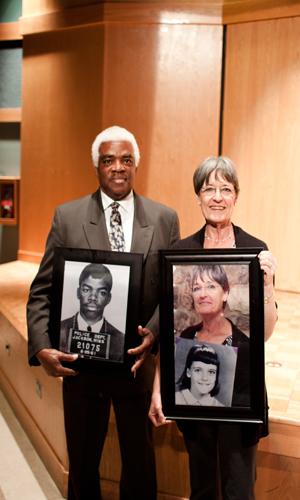As a part of Harlem and Beyond’s events to celebrate Black History Month, Janie McKinney and Claude Liggins, two people involved with the 1960s Freedom Rides, were at the Beale Memorial Library to share their stories of the historical event.
Protesting the intolerance to newly enacted integration laws in the ‘60s, college students of all races decided to test the laws by taking buses from the nation’s capitol to the Deep South.
The journey was uneventful until they reached the South, where Ku Klux Klan members attacked the group when the bus stopped at a small store.
The daughter of the storeowners, Janie McKinney, was there and offered help to the Freedom Riders.
As McKinney recalls, a man had broken the back window to the bus and then threw in some sort of incendiary device. The explosion on the bus forced all of the passengers, both regular passengers and protesters, off the bus and into the angry mob.
“I heard someone ask for water and thought, well I can do that,” she recalled. She filled up a large bucket with water and took it through the crowd to the group.
One man after was struck in the head with a wooden object and as he turned around McKinney recalled telling the man, “It’s just water, drink it,” as she offered him help. A caravan later arrived to pick up the Freedom Riders and took them to Birmingham.
It was this act of kindness and bravery that ended up making her an outcast in her community. She said the Klan did not go after her because she was a child that didn’t know what she was doing.
McKinney said she didn’t understand why colored people were only to be in the same place as white people if they were cleaning or working.
Unfortunately for the Freedom Riders this would be the last act of kindness they received before Birmingham, Alabama. In Birmingham they were beaten to the point where they had to stop the freedom ride.
A second wave of Freedom Riders, led by Diane Nash, was leaving from Nashville, Tennessee to Birmingham, Alabama to finish in New Orleans.
Knowing what they would face, the second wave of freedom riders dropped out of college and had already made their last wills.
When the group made it to Birmingham, Alabama they were arrested at the bus station.
The Freedom Rides went from May to September of that year, with new waves of integrated students challenging the racial inequality of the South, all of which were arrested and put in jail.
Liggins at the time was a student at Los Angeles Community College. Liggins said “When I heard about the Freedom Rides I thought I should be on that bus, and when I heard the bus was bombed I thought I really should have been on that bus.”
Liggins was determined to join the Freedom Riders and went on a trip from Washington to Alabama where he was arrested.
Liggins said that when they were arrested the judge took ten minutes to put them in jail for six months for disrupting the peace. In jail Liggins was imprisoned with other important members of the civil rights movement such as Stokely Carmichael and Diane Nash.
Liggins said that racial inequality is still an important issue today with regards to illegal immigration and separating families to send the parents back into their home country.
“I can’t imagine going to work one day and end up being kicked out of the country,” said Liggins.
Even though it took a few years for the South to integrate, the Freedom Riders showed that people can make a big change with the use of nonviolent protest.


